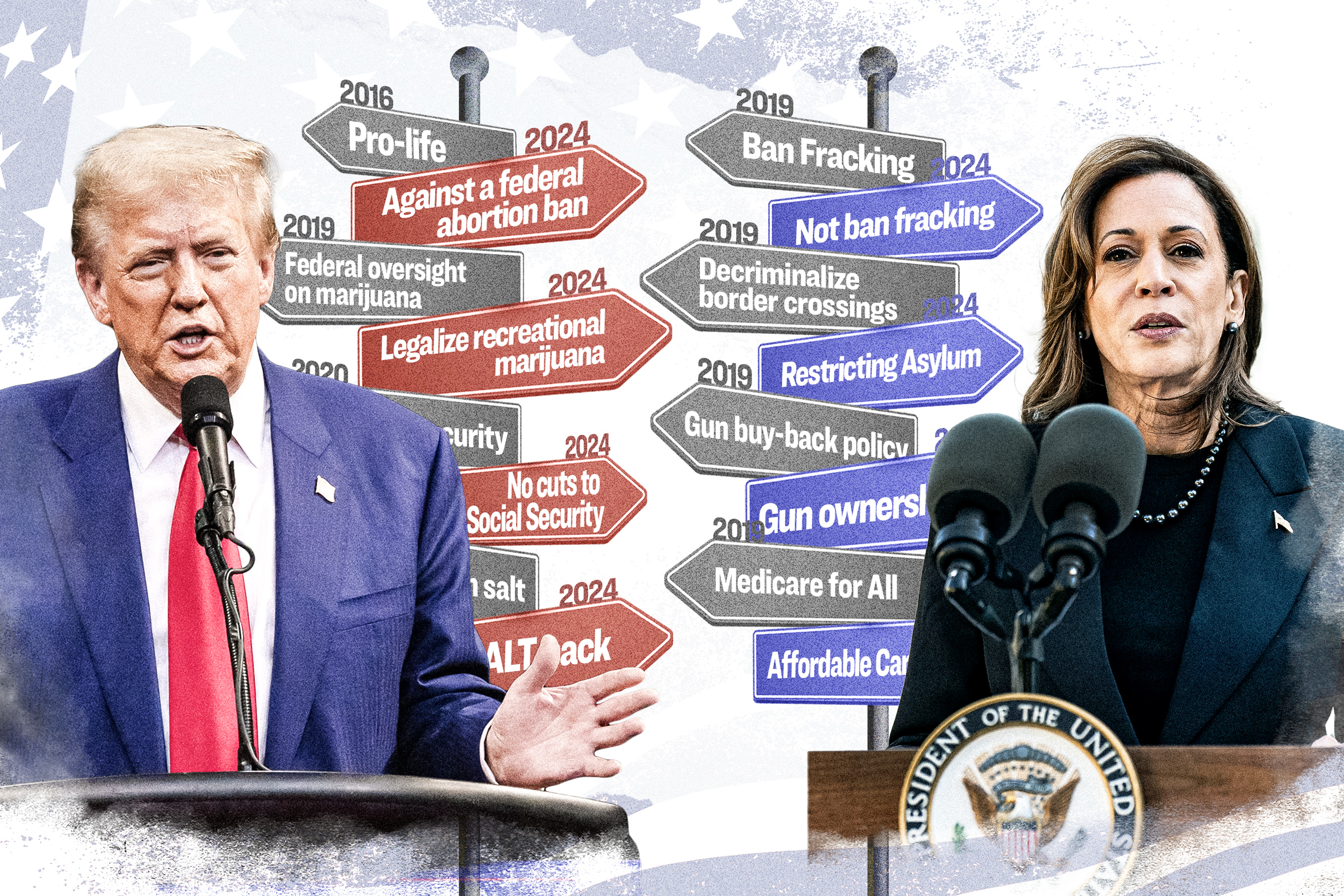Vice President Kamala Harris and former President Donald Trump have both changed their views on major issues throughout their careers.
Harris has recently asserted that “my values have not changed,” while Trump has similarly downplayed shifts in his opinions on political topics over his nearly five decades in the public eye.
“The advantage in switching positions is to move to the middle to attract moderate, undecided voters,” Robert Shapiro, a political science professor at Columbia University, told The Epoch Times. “The risk is looking awkward and perhaps alienating supporters of the original positions.”
Shapiro said that it’s probably a “good risk” at this stage, as the two candidates’ supporters will likely stick by them as they appeal to others.
However, switches can also lead voters to question a candidate’s judgment.
“After 9/11, a number of Democrats, including Hillary Clinton and John Kerry, voted for the Iraq War, only to change their minds when it went sideways,” John Murphy, a communications professor specializing in presidential rhetoric at the University of Illinois, told The Epoch Times.
“That hurt them later in the decade—created a flip-flopping issue for Kerry and a vulnerability for Clinton when Obama could say he had less experience but better judgment in 2008.”
Others suggest that while pivoting can be seen as a form of pandering, it has defensive advantages.
“I see both Harris and Trump attempting to use their changes in positions to blunt any attack that could be made against them from the other side,” Aaron Dusso, a political science professor at Indiana University–Indianapolis, told The Epoch Times.
The Epoch Times chose four policies that have seen an evolution in positions from each candidate. For Harris, her views on fracking, immigration, Medicare for All, and gun control, have all changed. Trump has shifted on abortion, marijuana, Social Security, and state and local tax deductions.
Harris on Fracking
While running for president in 2019, Harris said, “There’s no question, I’m in favor of banning fracking.”Fracking extracts oil or gas from underground by injecting water and chemicals at high pressures. It’s a critical industry in states such as Texas and Pennsylvania, the latter being a key battleground in the 2024 election.
Harris fought federal approvals of offshore fracking along California’s coastline while state attorney general.
Upon joining President Joe Biden’s team, she reversed her stance. During an August interview with CNN, Harris touted her tie-breaking vote for the Inflation Reduction Act, which expanded fracking leases.

Diversified Energy employees stand by a natural gas well in Franklin Township, Pa., on Sept. 6, 2024. (Rebecca Droke/AFP via Getty Images)
“What I have seen is that we can grow, and we can increase a thriving clean-energy economy without banning fracking,” Harris said. At the Sept. 10 presidential debate, she promised to not ban fracking.
Her pivot could be a sticking point if Trump brands her not as a “flip-flopper” on the issue but as merely “anti-fracking,” even if it isn’t accurate to her current position, Dusso said.
Harris on Immigration
When running for president in 2019, Harris supported the decriminalization of illegal border crossings. She said the role of Immigration and Customs Enforcement should be reexamined and endorsed decreasing the agency’s funding in an American Civil Liberties Union candidate questionnaire that year.
She is now against decriminalizing border crossings. Following a trip to the border in Douglas, Arizona, on Sept. 27, said she would support tougher restrictions on asylum, which the Biden administration implemented on Sept. 30.
“Those who cross our borders unlawfully will be apprehended and removed and barred from reentering for five years. We will pursue more severe criminal charges against repeat violators, and if someone does not make an asylum request at a legal point of entry and instead crosses our border unlawfully, they will be barred from receiving asylum,” Harris said at the event in Douglas.
She has also promised to revive the failed bipartisan border bill after hammering Trump for telling Senate Republicans to vote against it. The bill, which would require GOP support to pass in Congress, would fund thousands of new border agents and continue constructing a wall along the southern border. Critics say the bill doesn’t go far enough to secure the border.
“The Biden administration’s record on immigration has always been potentially a problem for her, although the fact that Trump scuppered the [border] bill has blunted that issue a good deal,” Murphy said.

2020 presidential candidate, Sen. Kamala Harris (D-Calif.) (C), and Sen. Kirsten Gillibrand (D-N.Y.) (R) visit a detention center for unaccompanied minors in Homestead, Fla., on June 28, 2019. (Joe Raedle/Getty Images)
Harris on Medicare for All
During her first year in the Senate, Harris co-sponsored Sen. Bernie Sanders’s (I-Vt.) Medicare for All Act of 2017, which would have replaced private insurance with a “national health insurance program” administered by the federal government.By her 2019 presidential run, she was promoting her own version of Medicare for All, which included private insurance. The plan called for taking the Medicare system and expanding it to all Americans to cover emergency room visits, doctors, vision, dental, hearing aids, mental health, substance addiction treatment, and reproductive health.
“In America, health care should be a right, not a privilege only for those who can afford it. It’s why we need Medicare for All,” Harris wrote in 2019.
During the 2024 debate with Trump, moderator Linsey Davis asked Harris about her pivots on Medicare for All and what her plan is today.

An ambulance drives past protesters supporting the Affordable Care Act near the Wilshire Federal Building in Los Angeles on Jan. 25, 2017. (David McNew/AFP via Getty Images)
“I absolutely support—and over the last four years as vice president—private health care options. But what we need to do is maintain and grow the Affordable Care Act,” she said. “The plan has to be to strengthen the Affordable Care Act, not get rid of it.”
Harris on Gun Control
During the 2019 presidential primary, Harris was one of five candidates who supported a mandatory buy-back program for so-called assault weapons, which would have required owners to sell certain guns to the federal government.At the recent presidential debate, Davis pointed out that Harris no longer supports a gun buy-back policy. Harris did not explain why her views had changed.
At campaign rallies, Harris has endorsed a general ban on “assault weapons” and tighter gun restrictions, including red flag laws.
“We who believe in the freedom to live safe from gun violence will finally pass universal background checks and an assault weapons ban,” she said at a July rally.
“Tim Walz and I are both gun owners. We’re not taking anybody’s guns away,” Harris said during the ABC debate with Trump after he alleged that she “has a plan to confiscate everybody’s gun.”
The Epoch Times contacted the Harris campaign for comment, but didn’t receive a response.
“If any moderate undecided voters are paying attention to Harris, her willingness to allow fracking and her gun ownership may send positive signals to them,” Shapiro said.
Trump on Abortion
Shortly before considering a third-party run for president in 1999 with the Reform Party, Trump told NBC’s “Meet the Press” that “I am very pro-choice.”When running for president in 2016, he cast himself as pro-life.

Pro-life supporters listen to President Donald Trump's speech at the 47th annual “March for Life” in Washington on Jan. 24, 2020. (Olivier Douliery/AFP via Getty Images)
Trump has taken credit for appointing three Supreme Court justices who helped overturn Roe v. Wade in the 2022 Dobbs decision, paving the way for both state-level abortion bans and amendments that have enshrined abortion access in many state constitutions.
He has said that he won’t sign a federal abortion ban, after previously endorsing a federal ban on abortions after 20 weeks of pregnancy while president.
Recently, Trump criticized Florida’s six-week abortion ban, calling it too restrictive. While at first seeming receptive to the upcoming state ballot initiative to reinstate abortion access in a constitutional amendment, he signaled that he would vote against the measure.
Trump on Marijuana
In 2018, Trump administration Attorney General Jeff Sessions rescinded the Obama-era Cole Memorandum, which had directed federal prosecutors to not pursue marijuana criminal offenses in states where it is legal under state law.In February 2017, White House press secretary Sean Spicer said the Justice Department would oversee “greater enforcement” of federal laws regarding recreational marijuana, as opposed to medical.

A legal cannabis dispensary is located in the East Village neighborhood of New York City on June 16, 2023. (Spencer Platt/Getty Images)
Spicer said, “There’s a big difference between the medical use ... [and] the recreational use, which is something the Department of Justice, I think, will be further looking into.”
He also suggested that there is a link between recreational marijuana use and opiate abuse.
Trump signed appropriations funding in 2019 that included language that prevented the Justice Department from using budgetary funds to prevent states from implementing their own medical marijuana laws.
He said in a statement, “My administration will treat this provision consistent with the president’s constitutional responsibility to faithfully execute the laws of the United States.”
Marijuana activists interpreted this as emphasizing the federal prohibition of cannabis over state laws.
Now, in 2024, Trump has endorsed Florida’s Amendment 3 ballot measure, which would legalize recreational marijuana for all adults older than 21. He also supported Biden’s efforts to reclassify marijuana as a less serious Schedule III drug rather than a Schedule I, which is reserved for substances deemed to have no medical value, such as heroin.
Trump on Social Security
During a 1999 “Meet the Press” interview, Trump said he would consider privatizing Social Security, although he didn’t “like the idea.”A year later, he authored a book titled “The America We Deserve,” in which he called for raising the retirement age to 70 and referred to Social Security as a “Ponzi scheme.”
During a 2020 CNBC interview, Trump said, “At some point, they will be [on the table]” regarding cuts to entitlements like Social Security and Medicare.
In another interview that year, he said, “Oh, we’ll be cutting.”
White House press secretary Stephanie Grisham later said on X that Trump was talking about “cutting deficits, NOT entitlements.”
Trump’s 2024 campaign has repeatedly promised no cuts to Social Security or Medicare and no changes to the retirement age.

People rally to urge the expansion of Social Security benefits, in front of the White House on July 13, 2015. (Win McNamee/Getty Images)
Trump on SALT
During his administration, Trump’s tax law capped the state and local tax deduction (SALT) at $10,000 per tax return, which is set to expire at the end of 2025. This deduction cap has been unpopular in high-tax blue states, where highly contested seats could determine which party controls the House in 2025.Ahead of a campaign trip to Long Island, New York, Trump reversed his position on SALT.
“I will turn [New York] around, get SALT back, lower your taxes, and so much more. I’ll work with the Democrat governor and mayor, and make sure the funding is there to bring New York State back to levels it hasn’t seen for 50 years,” Trump wrote in a Sept. 17 Truth Social post.
The Epoch Times contacted the Trump campaign for comment but didn’t receive a response.













